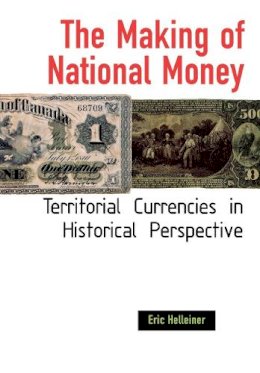
The Making of National Money. Territorial Currencies in Historical Perspective.
Eric Helleiner
Why should each country have its own exclusive currency? Eric Helleiner offers a fascinating and unique perspective on this question in his accessible history of the origins of national money.
Our contemporary understandings of national currency are, Helleiner shows, surprisingly recent. Based on standardized technologies of production and extraction, territorially exclusive national currencies emerged for the first time only during the nineteenth century. This major change involved a narrow definition of legal tender and the exclusion of tokens of value issued outside the national territory. "Territorial currencies" rapidly became bound up with the rise of national markets, and money reflected basic questions of national identity and self-presentation: In what way should money be managed to serve national goals? Whose pictures should go on the banknotes?
Helleiner draws out the potent implications of this largely unknown history for today's context. Territorial currencies face challenges from many monetary innovations—the creation of the euro, dollarization, the spread of local currencies, and the prospect of privately issued electronic currencies. While these challenges are dramatic, the author argues that their significance should not be overstated. Even in their short historical life, territorial currencies have never been as dominant as conventional wisdom suggests. The future of this kind of currency, Helleiner contends, depends on political struggles across the globe, struggles that echo those at the birth of national money.
Product Details
About Eric Helleiner
Reviews for The Making of National Money. Territorial Currencies in Historical Perspective.
Benjamin J. Cohen, University of California, Santa Barbara
Journal of Interdisciplinary History
Historians reading Helleiner's book should recognize that its true value lies less in its historical detail... than in its remarkable synthesis of a global phenomenon.... Historians would do well to use it as a guide to future research. Indeed, this overview should spark renewed interest in the history of money, particularly the relation between political and monetary systems. As a field, it is wide open for inquiry, and should it ever get the attention it deserves, Helleiner will deserve no small share of the credit.
Stephen Mihm
Business History Review
The work is a history of thought as much as a history, and the two themes are cleverly welded together.... In refreshing contrast to the tendency of economic historians to concentrate on the Anglo-Saxon or European experience, much attention is given to other areas of the world: Japan, China, Latin America, Africa, and the Middle East.
Lawrence H. Officer, University of Illinois
EH.NET Reviews
This book, which is well-written and persuasively argued, will be of interest to students and scholars of international political economy and international relations and to others interested in economic history and the historical roots of globalization.
Timothy B. Gravelle, University of Toronto
Political Studies Review
This is an excellent book that deserves a wide audience of international relations scholars, economists, and policymakers: It is ambitious, intelligent, insightful, learned, thorough, and gracefully written. The Making of National Money will soon be required reading for students of international political economy, as is Eric Helleiner's States and the Reemergence of Global Finance.
Rawi Abdelal, Harvard Business School
Perspectives on Politics
This work is pathbreaking for its theoretical, historical, and policy insights, and—as a result of this originality—raises new issues for theorists, researchers, and policymakers.... The Making of National Money makes an undeniably important contribution to historical, policy, and theoretical debates, and is essential for anyone interested in international relations, comparative economic institutions, or the international political economy.
Wesley W. Widmaier, St. Joseph's University
Comparative Political Studies
